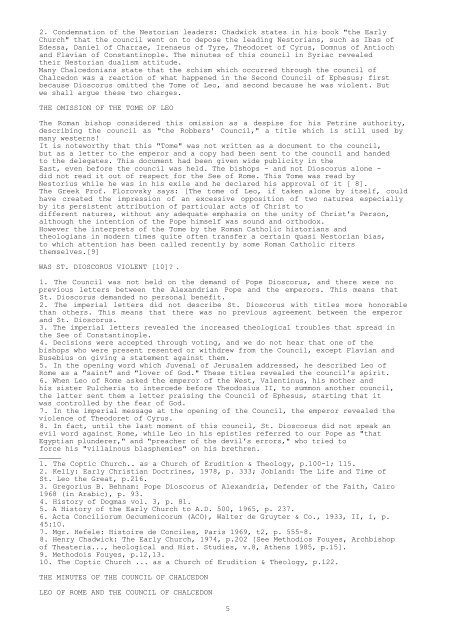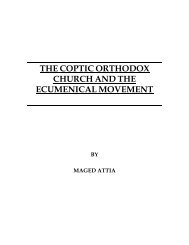Coptic interpretations of the Fourth Ecumenical Council - Saint Mina ...
Coptic interpretations of the Fourth Ecumenical Council - Saint Mina ...
Coptic interpretations of the Fourth Ecumenical Council - Saint Mina ...
You also want an ePaper? Increase the reach of your titles
YUMPU automatically turns print PDFs into web optimized ePapers that Google loves.
2. Condemnation <strong>of</strong> <strong>the</strong> Nestorian leaders: Chadwick states in his book "<strong>the</strong> Early<br />
Church" that <strong>the</strong> council went on to depose <strong>the</strong> leading Nestorians, such as Ibas <strong>of</strong><br />
Edessa, Daniel <strong>of</strong> Charrae, Irenaeus <strong>of</strong> Tyre, Theodoret <strong>of</strong> Cyrus, Domnus <strong>of</strong> Antioch<br />
and Flavian <strong>of</strong> Constantinople. The minutes <strong>of</strong> this council in Syriac revealed<br />
<strong>the</strong>ir Nestorian dualism attitude.<br />
Many Chalcedonians state that <strong>the</strong> schism which occurred through <strong>the</strong> council <strong>of</strong><br />
Chalcedon was a reaction <strong>of</strong> what happened in <strong>the</strong> Second <strong>Council</strong> <strong>of</strong> Ephesus; first<br />
because Dioscorus omitted <strong>the</strong> Tome <strong>of</strong> Leo, and second because he was violent. But<br />
we shall argue <strong>the</strong>se two charges.<br />
THE OMISSION OF THE TOME OF LEO<br />
The Roman bishop considered this omission as a despise for his Petrine authority,<br />
describing <strong>the</strong> council as "<strong>the</strong> Robbers' <strong>Council</strong>," a title which is still used by<br />
many westerns!<br />
It is noteworthy that this "Tome" was not written as a document to <strong>the</strong> council,<br />
but as a letter to <strong>the</strong> emperor and a copy had been sent to <strong>the</strong> council and handed<br />
to <strong>the</strong> delegates. This document had been given wide publicity in <strong>the</strong><br />
East, even before <strong>the</strong> council was held. The bishops - and not Dioscorus alone -<br />
did not read it out <strong>of</strong> respect for <strong>the</strong> See <strong>of</strong> Rome. This Tome was read by<br />
Nestorius while he was in his exile and he declared his approval <strong>of</strong> it [ 8].<br />
The Greek Pr<strong>of</strong>. Florovsky says: [The tome <strong>of</strong> Leo, if taken alone by itself, could<br />
have created <strong>the</strong> impression <strong>of</strong> an excessive opposition <strong>of</strong> two natures especially<br />
by its persistent attribution <strong>of</strong> particular acts <strong>of</strong> Christ to<br />
different natures, without any adequate emphasis on <strong>the</strong> unity <strong>of</strong> Christ's Person,<br />
although <strong>the</strong> intention <strong>of</strong> <strong>the</strong> Pope himself was sound and orthodox.<br />
However <strong>the</strong> interprets <strong>of</strong> <strong>the</strong> Tome by <strong>the</strong> Roman Catholic historians and<br />
<strong>the</strong>ologians in modern times quite <strong>of</strong>ten transfer a certain quasi Nestorian bias,<br />
to which attention has been called recently by some Roman Catholic riters<br />
<strong>the</strong>mselves.[9]<br />
WAS ST. DIOSCORUS VIOLENT [10]?<br />
1. The <strong>Council</strong> was not held on <strong>the</strong> demand <strong>of</strong> Pope Dioscorus, and <strong>the</strong>re were no<br />
previous letters between <strong>the</strong> Alexandrian Pope and <strong>the</strong> emperors. This means that<br />
St. Dioscorus demanded no personal benefit.<br />
2. The imperial letters did not describe St. Dioscorus with titles more honorable<br />
than o<strong>the</strong>rs. This means that <strong>the</strong>re was no previous agreement between <strong>the</strong> emperor<br />
and St. Dioscorus.<br />
3. The imperial letters revealed <strong>the</strong> increased <strong>the</strong>ological troubles that spread in<br />
<strong>the</strong> See <strong>of</strong> Constantinople.<br />
4. Decisions were accepted through voting, and we do not hear that one <strong>of</strong> <strong>the</strong><br />
bishops who were present resented or withdrew from <strong>the</strong> <strong>Council</strong>, except Flavian and<br />
Eusebius on giving a statement against <strong>the</strong>m.<br />
5. In <strong>the</strong> opening word which Juvenal <strong>of</strong> Jerusalem addressed, he described Leo <strong>of</strong><br />
Rome as a "saint" and "lover <strong>of</strong> God." These titles revealed <strong>the</strong> council's spirit.<br />
6. When Leo <strong>of</strong> Rome asked <strong>the</strong> emperor <strong>of</strong> <strong>the</strong> West, Valentinus, his mo<strong>the</strong>r and<br />
his sister Pulcheria to intercede before Theodosius II, to summon ano<strong>the</strong>r council,<br />
<strong>the</strong> latter sent <strong>the</strong>m a letter praising <strong>the</strong> <strong>Council</strong> <strong>of</strong> Ephesus, starting that it<br />
was controlled by <strong>the</strong> fear <strong>of</strong> God.<br />
7. In <strong>the</strong> imperial message at <strong>the</strong> opening <strong>of</strong> <strong>the</strong> <strong>Council</strong>, <strong>the</strong> emperor revealed <strong>the</strong><br />
violence <strong>of</strong> Theodoret <strong>of</strong> Cyrus.<br />
8. In fact, until <strong>the</strong> last moment <strong>of</strong> this council, St. Dioscorus did not speak an<br />
evil word against Rome, while Leo in his epistles referred to our Pope as "that<br />
Egyptian plunderer," and "preacher <strong>of</strong> <strong>the</strong> devil's errors," who tried to<br />
force his "villainous blasphemies" on his brethren.<br />
1. The <strong>Coptic</strong> Church.. as a Church <strong>of</strong> Erudition & Theology, p.100-1; 115.<br />
2. Kelly: Early Christian Doctrines, 1978, p. 333; Jobland: The Life and Time <strong>of</strong><br />
St. Leo <strong>the</strong> Great, p.216.<br />
3. Gregorius B. Behnam: Pope Dioscorus <strong>of</strong> Alexandria, Defender <strong>of</strong> <strong>the</strong> Faith, Cairo<br />
1968 (in Arabic), p. 93.<br />
4. History <strong>of</strong> Dogmas vol. 3, p. 81.<br />
5. A History <strong>of</strong> <strong>the</strong> Early Church to A.D. 500, 1965, p. 237.<br />
6. Acta Conciliorum Oecumenicorum (ACO), Walter de Gruyter & Co., 1933, II, i, p.<br />
45:10.<br />
7. Mgr. Hefele: Histoire de Conciles, Paris 1969, t2, p. 555-8.<br />
8. Henry Chadwick: The Early Church, 1974, p.202 [See Methodios Fouyes, Archbishop<br />
<strong>of</strong> Theateria..., heological and Hist. Studies, v.8, A<strong>the</strong>ns 1985, p.15].<br />
9. Methodois Fouyes, p.12,13.<br />
10. The <strong>Coptic</strong> Church ... as a Church <strong>of</strong> Erudition & Theology, p.122.<br />
THE MINUTES OF THE COUNCIL OF CHALCEDON<br />
LEO OF ROME AND THE COUNCIL OF CHALCEDON<br />
5








